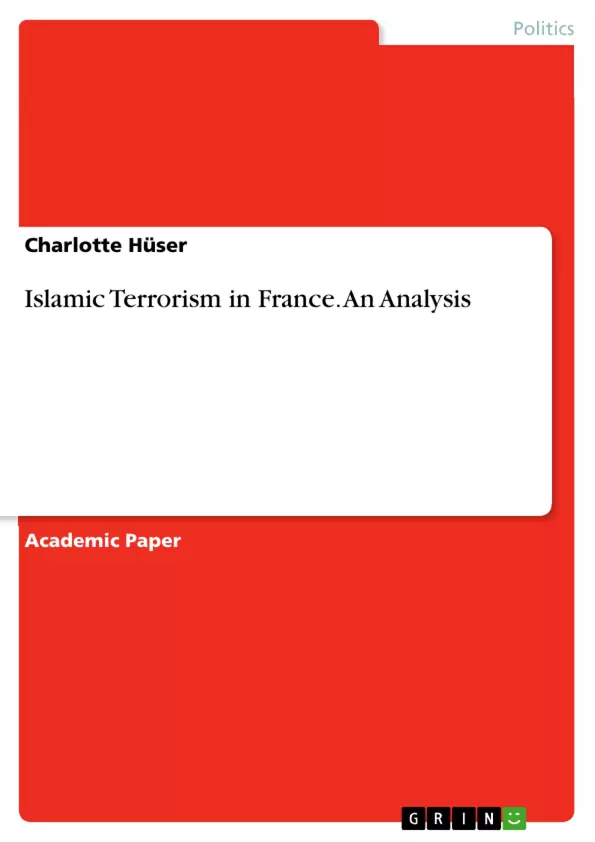This paper is analyzing the terrorist’s attacks of France since the proclamation of the caliphate and the refugee crisis in 2014. Focusing on the perpetuators and their reasons for the attacks in France – mainly on symbols of the French culture, like the national day, freedom of religion, freedom of speech as well as on state officials. The backgrounds of the attackers play an important role as well as the long-lasting and difficult relationship between France and the Muslim world mainly throughout their colonial history, their current interventions in wars as well as their inner state policies.
Inhaltsverzeichnis (Table of Contents)
- Abstract
- Introduction to the topic and the research question
- Major attacks
- Definition of (Islamic) terrorism
- Islamism in France
- Proclamation of the "caliphate"
- Refugee crisis
- The perpetrators and the French population analysis
- Colonial History and immigration
- Purpose of the Islamists attacks in France
- Frances colonial history
- French foreign policy: military interventions
- Domestic French politics: la laïcité
- Right wing and anti-islamic tendencies
- French internal security services and the prisons for Islamists
- Integration of Muslims
- Conclusion
Zielsetzung und Themenschwerpunkte (Objectives and Key Themes)
This paper examines the terrorist attacks in France since the declaration of the caliphate and the refugee crisis in 2014. The research focuses on the perpetrators and their motivations for targeting France, specifically symbols of French culture, religious freedoms, and state officials. The paper delves into the backgrounds of the attackers and the historical and contemporary relationship between France and the Muslim world, analyzing the impact of colonialism, military interventions, and internal policies on the situation.
- The motivations behind Islamic terrorist attacks in France
- The role of France's colonial history and contemporary foreign policy in the rise of Islamism
- The impact of the "caliphate" declaration and the refugee crisis on the situation in France
- The relationship between French internal security services and the Muslim community
- The influence of French domestic politics on the perception and treatment of Islam
Zusammenfassung der Kapitel (Chapter Summaries)
- The paper begins by outlining the significant rise of Islamic terrorist attacks in Europe, particularly in the United Kingdom, Germany, and France. It highlights the increasing frequency of these attacks and the fear they have instilled in European societies, emphasizing the disproportionate fear of terrorism in France.
- The introduction lays out the research question: whether France is a specific target for Islamist terrorist attacks and what the perpetrators' objectives are. The paper proposes to analyze the historical context, particularly the years following 2014, when the caliphate was declared and the refugee crisis began.
- The section on major attacks details key terrorist events in France, including the January 2015 Charlie Hebdo shooting, the kosher supermarket hostage taking, and other significant incidents.
- The section on Islamism in France examines the proclamation of the "caliphate" and the refugee crisis, exploring their impact on the rise of Islamism and the motivations behind the attacks.
Schlüsselwörter (Keywords)
This paper focuses on key themes such as Islamic terrorism, France, Islamism, colonialism, foreign policy, domestic politics, security services, and the integration of Muslims. It delves into the motivations of perpetrators, the historical relationship between France and the Muslim world, and the influence of political and social factors on the current situation in France.
- Citation du texte
- Charlotte Hüser (Auteur), 2019, Islamic Terrorism in France. An Analysis, Munich, GRIN Verlag, https://www.grin.com/document/510257



